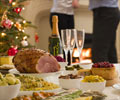
Association of health benefits and harms of Christmas dessert ingredients in recipes from The Great British Bake Off: umbrella review of umbrella reviews of meta-analyses of observational studies
Go to source).
Analyzing the Nutritious Profile of Great British Bake Off’s Christmas Treats
As the holiday season approaches, the age-old debate resurfaces: can we indulge in Christmas desserts without feeling the pang of guilt? Can we look past the negative headlines of what butter and sugar do to our bodies, and enjoy a piece of Christmas cake in heavenly peace? To answer this Christmas conundrum, researchers set out to determine the health benefits and harms of various ingredients in festive desserts from The Great British Bake Off, a show that the team believes is “the greatest television baking competition of all time.”‘Among ‘The Great British Bake Off’ ingredients, fruits, coffee, and nuts were associated with a lower risk of mortality, whereas alcohol and sugar were linked to a higher risk of diseases and death. #christmastreats #holidayseason #merrychristmas #greatbritishbakeoff #healthytreats #lowmortality’
Tweet it Now
They said “bah Humbug” to the design flaws of nutritional observational research and conducted an umbrella review of umbrella reviews of meta-analyses of observational studies evaluating the associations between ingredients in 48 Christmas dessert recipes on The Great British Bake Off website (cakes, biscuits, pastries, puddings, and desserts) and the risks of dying or developing various diseases. Umbrella reviews synthesize previous meta-analyses and provide a high-level summary of evidence on a particular topic.
From each recipe, they recorded the ingredients and put them into 17 groups: baking soda, powder, and other ingredients; butter; chocolate; cheese and yogurt; coffee; eggs; food coloring, flavorings, and extracts; fruit; milk; nuts (general or tree, excluding peanuts); peanuts or peanut butter; refined flour; salt; spices; sugar; and vegetable fat.
The team conducted a comprehensive literature search, screened 7008 records, and ultimately identified 46 umbrella reviews that evaluated the associations between these ingredients and the risks of dying or developing various diseases.
They found 363 associations between ingredients and risk of death or disease, of which 149 were statistically significant, including 110 (74%) that estimated that the ingredient groups reduced the risk of death or disease and 39 (26%) that increased the risk.
Advertisement
Sadly, for Prue Leith (The Great British Bake Off judge who enjoys a spot of alcohol in her bakes), alcohol (20 of 39, 51%) was the most common ingredient group associated with increased risk of death or disease, alongside sugar (5 of 39, 13%).
Advertisement
However, the researchers identified Paul Hollywood’s Stollen as a potential option, with 82 significant associations, of which 70 suggested the ingredient groups decreased the risk of disease. The recipe contained ingredients such as almonds, milk, and dried fruits, and “overall, without the eggs, butter, and sugar, this dessert is essentially a fruit salad with nuts. Yum!”, the researchers say.
The researchers point to several limitations. For example, the study relies on evidence from observational studies, which have inherent limitations that are difficult or impossible to address, focuses on specific ingredient groups rather than broader dietary exposures, and does not capture all ingredients in these Christmas desserts, such as food coloring.
What’s more, they did not account for the amount of each ingredient in the recipes, admitting that “any recipe with fruit, even if it was only one berry, was weighted equally in terms of its protective effect about the harmful effect of butter.” They acknowledge that a weighted analysis “would have been informative, but less fun.”
Nevertheless, they conclude that “this Christmas, if concerns about the limitations of observational nutrition research can be set aside, we are pleased to report that everyone can have their cake and eat it too.”
Reference:
- Association of health benefits and harms of Christmas dessert ingredients in recipes from The Great British Bake Off: umbrella review of umbrella reviews of meta-analyses of observational studies - (https://www.bmj.com/content/383/bmj-2023-077166)














